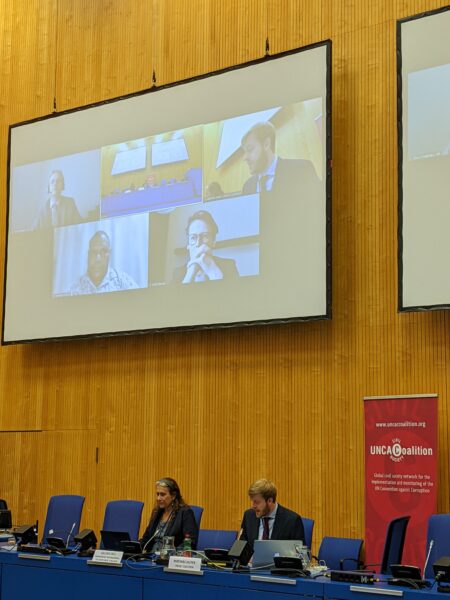As States Parties are currently deliberating the modalities of the Implementation Review Mechanism’s (IRM) follow-up phase, an event on the margins of the 14th session of the Implementation Review Group (IRG) in June 2023 organized by the UNCAC Coalition and sponsored by the UK focused on the future of the IRM. Four panelists discussed how to improve the IRM’s effectiveness and promote increased transparency and inclusiveness of the review.

Chris Chalmers, Deputy Director, UK Foreign, Commonwealth & Development Office, highlighted the importance of transparency in the review mechanism. The UK sees the UNCAC transparency pledge as a gold standard in this regard. Looking to the next cycle of the IRM, measures by states to enhance transparency could include publishing timeline reviews and keeping focal points updated, publishing the full review report, and engaging civil society and non-state actors. Although these are difficult endeavors, the UK is keen to work with other countries to see which ideas to focus on. The involvement of civil society is crucial to increase accountability and a sense of urgency to the review and make the country reports stronger. Beyond that, governments should include civil society representatives in delegations of the 10th Conference of the States Parties.
Yuambari Haihuie, Transparency International (TI) Papua New Guinea, emphasized the contribution of the UNCAC review to the national agenda on anti-corruption in Papua New Guinea. TI Papua New Guinea’s participation in the review process has been straightforward due to its prior engagement in the development of a national anti-corruption strategy. The organization was invited by the government to participate in the peer review and subsequently also to attend IRG meetings as part of the official delegation. This was only the second time civil society was able to participate in a subsidiary meeting with the government. However, the follow-up to the country review remains unclear, as well as how civil society could engage in it. Much could be learned from other anti-corruption evaluation mechanisms in this regard.
Aoife Murray, International Anti-Corruption Academy (IACA), discussed the strengths and limitations of the IRM based on the findings from IACA’s Global Program on Measuring Corruption. One major strength of the review mechanism is the normative framework it provides through the UNCAC. However, the mechanism’s format and structure are difficult to engage with and information on the review is not accessible or difficult to interpret for a wide user group. The absence of a follow-up mechanism is another significant limitation. For the next phase of the UNCAC review mechanism, the utility and accessibility of data need to be improved. To enable countries to monitor progress over time, the process needs to be more transparent. In addition to that, the private sector should be involved in the review.
Gillian Dell, Global Advocacy Lead, Transparency International and Co-Chair of the UNCAC Coalition, presented recommendations for the UNCAC IRM based on good practices from other review mechanisms. Instead of relying on self-assessment only, one way forward would be to include outside assessments, for instance, academic studies. Other review mechanisms show that greater transparency is possible by publishing press releases promptly when the review is concluded, including critical releases. Plenary reports are another element that is missing in the UNCAC review mechanism. All other existing mechanisms have a follow-up and some conduct compliance ratings. To improve the IRM’s transparency, effectiveness, and inclusiveness, we need to start by looking at the goals. One best practice example is the OECD Anti-Corruption Network for Eastern Europe and Central Asia. The review mechanism would also benefit from better quality reports to increase the confidence of the public in its seriousness. Finally, there needs to be a stronger focus on civil society and participation elements.



